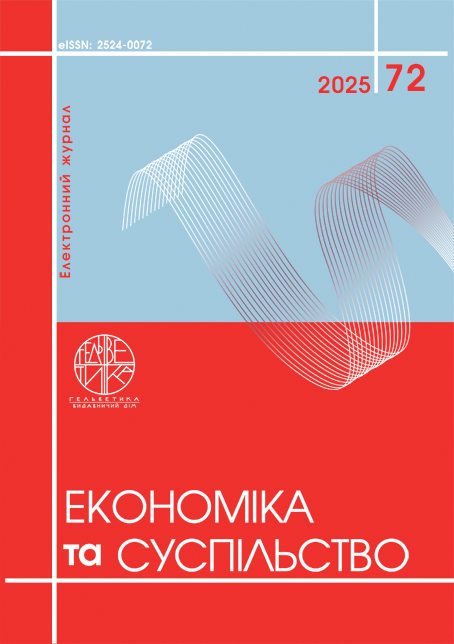CURRENT STATE OF PATENT TRENDS IN ARTIFICIAL INTELLIGENCE AND MACHINE LEARNING TECHNOLOGIES IN INTERNATIONAL TRADE FLOW MANAGEMENT
Abstract
The article explores the transformative role of artificial intelligence (AI) and machine learning technologies in international trade, examining their profound impact on global economic processes and technological innovation. By analyzing emerging patent trends and technological developments, the research highlights how AI is fundamentally reshaping trade dynamics, logistics, and strategic decision-making. AI technologies are increasingly becoming critical drivers of digital transformation in international commerce, enabling unprecedented levels of efficiency, predictive accuracy, and operational optimization. The research delves into how machine learning algorithms are revolutionizing core trade functions, including demand forecasting, supply chain management, risk assessment, and customs procedures. These intelligent systems are not merely technological tools but strategic assets that empower businesses to develop more adaptive, responsive, and competitive models. The study critically examines the complex landscape of AI implementation in trade, addressing both its immense potential and the significant challenges surrounding intellectual property rights, regulatory frameworks, and technological standardization. By exploring patent activities, investment trends, and geographical distributions of AI development, the research provides insights into the global technological competition and the shifting paradigms of innovation. Particularly significant is the exponential growth in patent applications and the dramatic shift in technological leadership toward China, demonstrating profound changes in the global innovation landscape. Furthermore, it examines critical challenges in AI patenting, including novelty assessment, determining AI authorship, data protection issues, and algorithmic biases that may impact fair trade practices. Crucially, AI's integration into international trade represents more than a technological upgrade—it signifies a fundamental reimagining of global economic interactions, ultimately facilitating greater global connectivity and opening new horizons for businesses across diverse sectors.
References
Guo S. Application of Artificial Intelligence Technology in International Trade Finance. The 2020 International Conference on Machine Learning and Big Data Analytics for IoT Security and Privacy. 2021. С. 155-162. DOI:10.1007/978-3-030-62743-0_22
Economic impacts of artificial intelligence (AI). Marcin Szczepański. 2019. 8 c. URL: https://www.europarl.europa.eu/RegData/etudes/BRIE/2019/637967/EPRS_BRI(2019)637967_EN.pdf (дата звернення: 3.03.2025).
Ozturk О. The Impact of AI on International Trade: Opportunities and Challenges. 2024. URL: https://www.mdpi.com/2227-7099/12/11/298 (дата звернення: 04.03.2025).
Meltzer J. The impact of artificial intelligence on international trade. 2018. 9 c. URL: https://www.hinrichfoundation.com/media/2bxltgzf/meltzerai-and-trade_final.pdf (дата звернення: 05.03.2025).
Artificial Intelligence Index Report 2024. Stanford HAI. 2024. 51 c. URL: https://hai-production.s3.amazonaws.com/files/hai_ai-index-report-2024_chapter1.pdf (дата звернення: 08.03.2025).
Ferencz J., López-González J., García I. ARTIFICIAL INTELLIGENCE AND INTERNATIONAL TRADE. OECD TRADE POLICY PAPER. 2022. 35 с. URL: https://www.oecd.org/content/dam/oecd/en/publications/reports/2022/04/artificial-intelligence-and-international-trade_9034b5f2/13212d3e-en.pdf (дата звернення: 10.02.2025)
WIPO. The Story of AI in Patents. URL: https://www.wipo.int/en/web/technology-trends/artificial_intelligence/story (дата звернення: 11.03.2025).
WIPO Technology Trends 2019. WIPO. 2024. 158 c. URL: https://www.wipo.int/edocs/pubdocs/en/wipo_pub_1055.pdf (дата звернення: 13.03.2025).
IDC. Worldwide Spending on Artificial Intelligence Forecast to Reach $632 Billion in 2028. URL: https://www.idc.com/getdoc.jsp?containerId=prUS52530724 (дата звернення: 14.03.2025).
Igbinenikaro E., Adewusi A. O. NAVIGATING THE LEGAL COMPLEXITIES OF ARTIFICIAL INTELLIGENCE IN GLOBAL TRADE AGREEMENTS. 2024. С. 488-505. URL: https://www.researchgate.net/publication/380905924_NAVIGATING_THE_LEGAL_COMPLEXITIES_OF_ARTIFICIAL_INTELLIGENCE_IN_GLOBAL_TRADE_AGREEMENTS (дата звернення: 14.03.2025).
Mensah G. B. Artificial Intelligence and Ethics: A Comprehensive Review of Bias Mitigation, Transparency, and Accountability in AI Systems. 2023. 27 c. URL: https://www.researchgate.net/publication/375744287_Artificial_Intelligence_and_Ethics_A_Comprehensive_Review_of_Bias_Mitigation_Transparency_and_Accountability_in_AI_Systems (дата звернення: 16.03.2025).
Trading with intelligence: How AI shapes and is shaped by international trade. 2024. 118 c. URL: https://www.wto.org/english/res_e/booksp_e/trading_with_intelligence_e.pdf (дата звернення: 18.03.2025).
Guo S. (2021) Application of Artificial Intelligence Technology in International Trade Finance. The 2020 International Conference on Machine Learning and Big Data Analytics for IoT Security and Privacy, pp. 155–162. DOI:10.1007/978-3-030-62743-0_22
Marcin Szczepański. (2019) Economic impacts of artificial intelligence (AI). 8 p. Available at: https://www.europarl.europa.eu/RegData/etudes/BRIE/2019/637967/EPRS_BRI(2019)637967_EN.pdf (accessed March 3, 2025).
Ozturk O. (2024) The Impact of AI on International Trade: Opportunities and Challenges. Available at: https://www.mdpi.com/2227-7099/12/11/298 (accessed March 4, 2025).
Meltzer J. (2018) The impact of artificial intelligence on international trade. 9 p. Available at: https://www.hinrichfoundation.com/media/2bxltgzf/meltzerai-and-trade_final.pdf (accessed March 5, 2025).
Stanford HAI. (2024) Artificial Intelligence Index Report 2024. 51 p. Available at: https://hai-production.s3.amazonaws.com/files/hai_ai-index-report-2024_chapter1.pdf (accessed March 8, 2025).
Ferencz J., López-González J., García I. (2022) Artificial Intelligence and International Trade. OECD Trade Policy Paper, 35 p. Available at: https://www.oecd.org/content/dam/oecd/en/publications/reports/2022/04/artificial-intelligence-and-international-trade_9034b5f2/13212d3e-en.pdf (accessed March 10, 2025).
WIPO. The Story of AI in Patents. Available at: https://www.wipo.int/en/web/technology-trends/artificial_intelligence/story (accessed March 11, 2025).
WIPO. (2024) WIPO Technology Trends 2019. 158 p. Available at: https://www.wipo.int/edocs/pubdocs/en/wipo_pub_1055.pdf (accessed March 13, 2025).
IDC. Worldwide Spending on Artificial Intelligence Forecast to Reach $632 Billion in 2028. Available at: https://www.idc.com/getdoc.jsp?containerId=prUS52530724 (accessed March 14, 2025).
Igbinenikaro E., Adewusi A. O. (2024) Navigating the Legal Complexities of Artificial Intelligence in Global Trade Agreements, pp. 488–505. Available at: https://www.researchgate.net/publication/380905924_NAVIGATING_THE_LEGAL_COMPLEXITIES_OF_ARTIFICIAL_INTELLIGENCE_IN_GLOBAL_TRADE_AGREEMENTS (accessed March 14, 2025).
Mensah G. B. (2023) Artificial Intelligence and Ethics: A Comprehensive Review of Bias Mitigation, Transparency, and Accountability in AI Systems. 27 p. Available at: https://www.researchgate.net/publication/375744287_Artificial_Intelligence_and_Ethics_A_Comprehensive_Review_of_Bias_Mitigation_Transparency_and_Accountability_in_AI_Systems (accessed March 16, 2025).
WTO. (2024) Trading with Intelligence: How AI Shapes and Is Shaped by International Trade. 118 p. Available at: https://www.wto.org/english/res_e/booksp_e/trading_with_intelligence_e.pdf (accessed March 18, 2025).

This work is licensed under a Creative Commons Attribution 4.0 International License.


